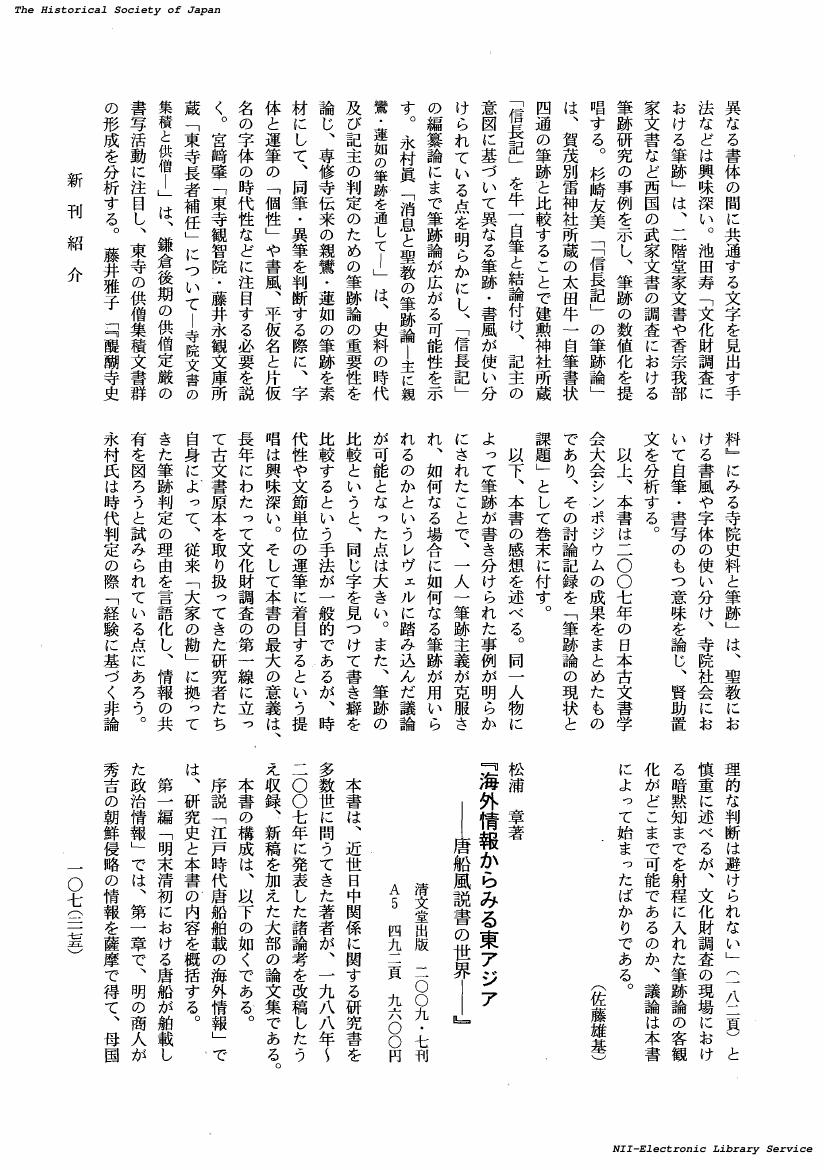- 著者
- 松方 冬子
- 出版者
- 公益財団法人史学会
- 雑誌
- 史學雜誌 (ISSN:00182478)
- 巻号頁・発行日
- vol.114, no.9, pp.一四九七-一五二八, 2005-09-20
This article focuses on the letter sent by Willem II, king of the Netherlands, to the Japanese shogun in August 1844, in order to reconsider if its aim was really "to recommend the opening of Japan", as conventionally thought. The author examines the decision-making process within the Dutch government before sending the king's letter and concludes that the main inducement for sending the letter was to gauge the issuance of a new decree in 1842. They wanted to find out if the Bakufu intended to abandon its seclusion policy totally or to make only minor concessions. The second purpose was to make a breakthrough in traditional Japanese-Dutch relations through the authorities in Nagasaki. The Dutch government knew that information could be lost or censored before it reached the highest levels in Edo, because of many intermediaries between the Dutch chief factor in Nagasaki and the Bakufu. At that time, the Netherland was facing a fiscal crisis resulting primarily from the loss of revenue that followed Belgian independence in 1830. Thus the Dutch government resigned itself to dispatch of a special envoy to Japan on fisial grounds, and ordered the chief factor instead to do the mission. The author argues that the main points of the king's letter were to confirm if Bakufu officials understood the changing circumstances in East Asia, and to discern whether the Bakufu intended to open Japan to international trade. On the second point, the Dutch government clearly received a very distinct answer to its inquiry, which showed the sending of letter was successful for the Dutch government. The author is doubtful that the Dutch government expected the letter to help expand trade with Japan. It is because she found no mention of their urge to open Japan in the Dutch governmental documents and because they did not provide any actual process for opening the country, for example a draft of a commercial treaty, in the king's letter itself. Apparently, the letter carried advice to open Japan, but it was only as an expedient to avoid armed conflict supposedly with Great Britain, which seemed to attempt commercial relationship with Japan next China after the Opium War. The Dutch government in fact did not want such new relations between Japan and Western powers, and valued the Bakufu's answer as a new permit for monopolizing the Japanese trade. Their attempt at direct communications beyond Nagasaki was not successful. The direct road to Edo was closed by the answer from the Bakufu councilors for the king's letter.
- 著者
- 松方 冬子
- 出版者
- 洋学史学会 ; 1993-
- 雑誌
- 洋学 = Annals of the Society for the History of Western Learning in Japan : 洋学史学会研究年報 (ISSN:13438859)
- 巻号頁・発行日
- no.27, pp.103-123, 2020
- 著者
- 松方 冬子
- 出版者
- 東京大学出版会
- 雑誌
- UP (ISSN:09133291)
- 巻号頁・発行日
- vol.49, no.5, pp.42-47, 2020-05
1 0 0 0 OA 朱印船のアジア史的研究:16~17世紀、日本往来の「国書」と外交使節
- 著者
- 松方 冬子 蓮田 隆志 橋本 雄 岡本 真 彭 浩 高野 香子 川口 洋史 木村 可奈子 清水 有子 原田 亜希子 北川 香子 西澤 美穂子
- 出版者
- 東京大学
- 雑誌
- 基盤研究(B)
- 巻号頁・発行日
- 2015-04-01
主たる成果として、松方冬子編『国書がむすぶ外交』(東京大学出版会、2019年)を刊行し、前近代のユーラシアの全域にみられた「国書外交」とその周辺にあった通航証について明らかにした。おもな論点は、今までtributary system(華夷秩序・朝貢体制・東アジア国際秩序などと訳される)と呼ばれてきたものは、その実態からみるならば国書外交と呼べるものであること、国と国をつなぐ仲介者(商人や宗教者、国書の運び手となることが多い)の役割が重要であること、である。台湾の中央研究院で日明勘合底簿の手掛かりとなる史料を発見するなど、多くの実証的な新知見を明らかにした。
1 0 0 0 オランダ風説書 : 「鎖国」日本に語られた「世界」
- 著者
- 松方 冬子
- 出版者
- 公益財団法人 史学会
- 雑誌
- 史学雑誌 (ISSN:00182478)
- 巻号頁・発行日
- vol.118, no.12, pp.2175-2177, 2009-12-20 (Released:2017-12-01)
1 0 0 0 IR 趣旨説明 : 『教養としての世界史の学び方』へのコメントをかねて
- 著者
- 松方 冬子
- 出版者
- 東京大学連携研究機構ヒューマニティーズセンター
- 雑誌
- Humanities Center Booklet (ISSN:24349852)
- 巻号頁・発行日
- no.4, pp.1-4, 2020-07-10
「社会科学と人文学の対話――『国書がむすぶ外交』総論を素材に」東京大学ヒューマニティーズセンター オープンセミナー特別回より
- 著者
- 松方 冬子
- 出版者
- 公益財団法人史学会
- 雑誌
- 史學雜誌 (ISSN:00182478)
- 巻号頁・発行日
- vol.116, no.1, 2007-01-20
- 著者
- 古川 祐貴 岡本 真 松方 冬子
- 出版者
- 東京大学史料編纂所
- 雑誌
- 東京大学史料編纂所研究紀要 (ISSN:09172416)
- 巻号頁・発行日
- no.29, pp.15-35, 2019-03
1 0 0 0 OA 江戸幕府・朝廷・諸藩の編年史・編纂史料集の史料学的研究
- 著者
- 山本 博文 佐藤 孝之 宮崎 勝美 松方 冬子 松澤 克行 横山 伊徳 鶴田 啓 保谷 徹 鶴田 啓 保谷 徹 横山 伊徳 小宮 木代良 杉本 史子 杉森 玲子 箱石 大 松井 洋子 松本 良太 山口 和夫 荒木 裕行 及川 亘 岡 美穂子 小野 将 木村 直樹 松澤 裕作
- 出版者
- 東京大学
- 雑誌
- 基盤研究(A)
- 巻号頁・発行日
- 2006
本研究は、江戸時代および明治時代に編纂された史料集を網羅的に蒐集し、その記事をデータベースとして一般公開すること、蒐集した史料の伝存過程および作成された背景について分析・考察すること、を目的としている。本研究は、従来、交流する機会のなかった異なる分野の研究者が、1つの史実を通じて活発な議論を戦わせる土壌を作り、近世史研究の進展に大きく寄与することになった。

